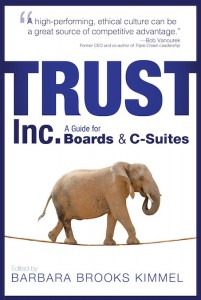
Trustworthy businesses are also more profitable. There is simply no reason NOT to implement long-term strategies for increasing organizational trust starting today.
How can your organization elevate its level of trustworthiness?
Hint: It starts with the leader.
#1 Trustworthy leadership – Very simply, a culture of trust cannot exist with an untrustworthy leader. Trustworthy behavior must start at the top and carry down through every manager in an organization.
#2 Transformation – Productivity and execution begin when the CEO creates a set of values and goals that are shared, accepted and adopted by all stakeholders (employees, customers, suppliers, vendors, shareholders, etc.) CEOs should regularly address all stakeholders about the steps being taken to build trustworthy behavior within the organization. Trust should not be confused with compliance, CSR or PR. Being “legal”, having a CSR program or “advertising” your trustworthiness, are not synonymous with being trustworthy.
#3 Tools – There are many trust tools CEOs can use to build trust with their internal and external stakeholders. These run the gamut from metrics and assessments to online surveys. The results may be surprisingly good, or just the opposite. And if they are the latter, and really bad, it’s time to get busy. And maybe time to add a Chief Trust Officer to the C-Suite to oversee the implementation of long-term trust building strategies.
#4 Treatment– The Golden Rule says to “treat others the way you want to be treated.” This certainly holds true for trust. The CEO that extends trust to his or her stakeholders is more likely to have it returned. Trust fundamentally works by a series of reciprocating actions between the truster and the trusted.
#5 Teamwork – Teamwork leads to better decisions and better outcomes. Teams create trust, and trust creates teams. Breaking down silos, and in particular exhibiting trustworthy behavior in the C-Suite, should be on every CEO’s priority list. Teams whose members trust each other escalate both innovation and decision-making.
#6 Talk – Your stakeholders need to know what steps you are taking to build a trustworthy organization. Quarterly numbers are no longer the “be all and end all.” In fact, evidence is mounting that a trustworthy culture and “good numbers” go hand in hand. As mentioned earlier, long-term trustworthy behavior is more profitable – every quarter – than short-term changes that don’t “stick.”
#7 Truth – Truth-telling is at the core of trust. Any CEO who wants to build a trustworthy organization must have an extremely comfortable relationship with the truth. No company is perfect and it’s not necessary to air all the dirty laundry – just don’t lie about it or intentionally mislead. In times of crisis, a habit of truth telling yields particularly good returns. The absence of such habits can be disastrous.
#8 Time – Building a culture of trustworthy business does not happen overnight. It takes time, maybe even years – but not decades. The CEO who invests the time to educate himself or herself about how to build trust with teams and stakeholders — then develops a plan, communicates and implements it – will be rewarded with greater stakeholder trust. When a slip-up occurs, those who “banked” trust will recover faster.
#9 Transparency – Merriam Webster defines “transparent” as visibility or accessibility of information, especially with business practices. Any CEO who thinks he or she can still hide behind a veil of secrecy need only spend a few minutes on social media reading what their stakeholders are saying. In today’s world, transparency is no longer the risk – opacity has become the risk. Transparency must exist inside and outside the company. Communications and social media have roles to play here, but the fundamental is that transparency builds trust.
#10 Thoughtful – Not all stakeholders need to know the company’s trade secrets, or what the CEO had for dinner. But if your company is serious about increasing trustworthiness, consider engaging all your stakeholders in rich, thoughtful conversations. Don’t approach them as constituencies to be maneuvered, managed or massaged. Instead, view them as vital contributors to a better organization by letting them into the conversation. To be a thoughtful company with a thoughtful strategy, trust the stakeholders to be thoughtful.
These suggestions are among dozens outlined in our award-winning TRUST Inc. book series. For your own personal well-being, and that of your organization, stop talking about trust and do something about it.
Barbara Brooks Kimmel is the Executive Director of Trust Across America-Trust Around the World whose mission is to help organizations build trust. She is also the editor of the award winning TRUST INC. book series and the Executive Editor of TRUST! Magazine. In 2012 Barbara was named “One of 25 Women Changing the World” by Good Business International.
Our 2015 Poster, 52 Weeks of Activities to Increase Organizational Trust is available to those who would like to support our work by making a small donation.
Copyright 2015, Next Decade, Inc.





Recent Comments